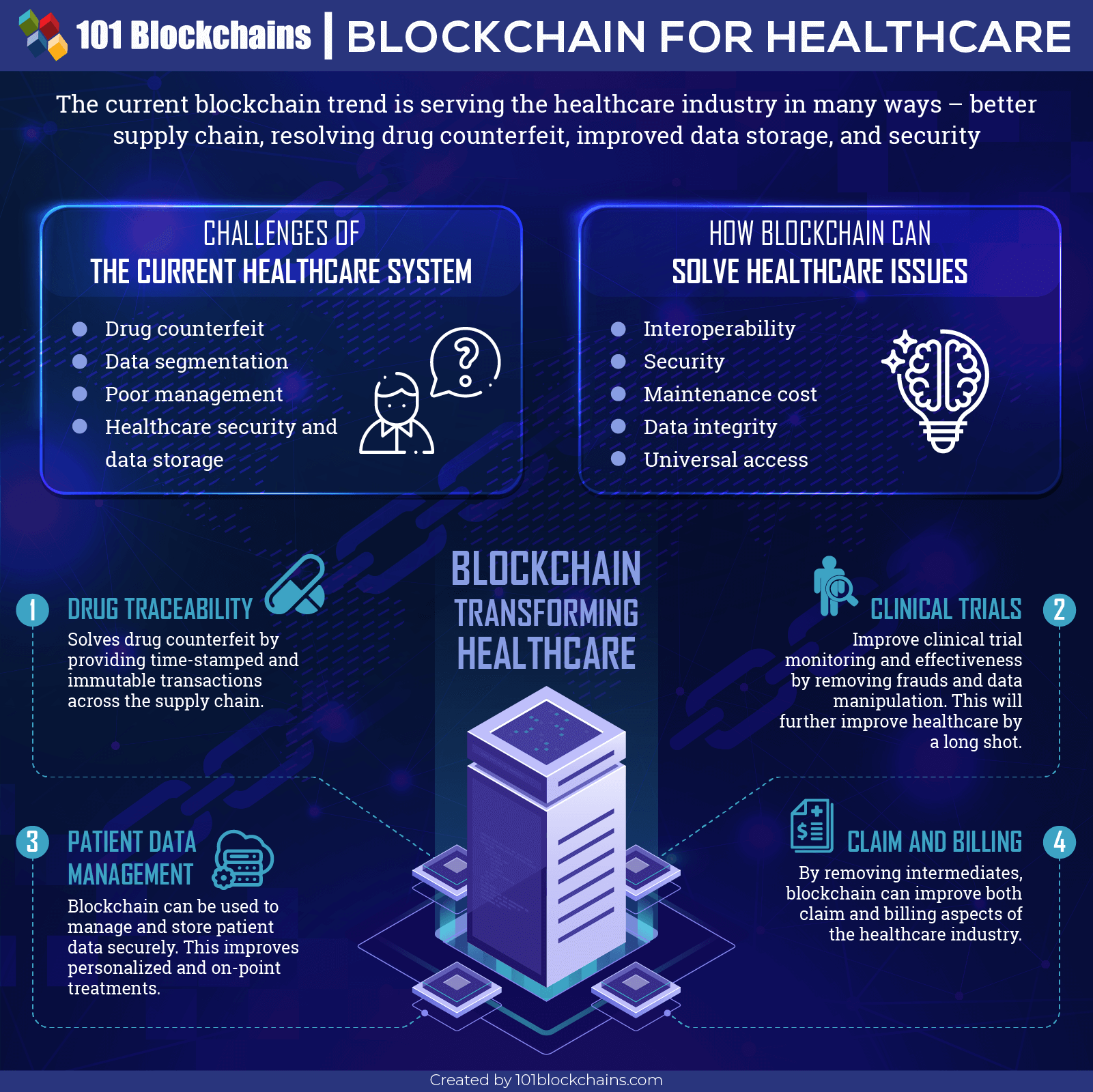From Crypto to Cures: How Blockchain is Revolutionizing Healthcare


The healthcare industry is one of the most critical industries that require high levels of trust, accuracy, and security. Blockchain, a revolutionary technology that provides a decentralized, transparent, and secure way of storing and sharing information, is transforming the healthcare industry by enhancing data management, drug traceability, and patient privacy. In this article, we’ll explore how blockchain is changing the face of healthcare and revolutionizing the way we approach medical care.


Securing Sensitive Medical Data
The healthcare industry generates vast amounts of data, including patient records, medical research, and clinical trial results. This data is highly sensitive and requires the highest level of security to protect patient privacy and prevent unauthorized access or tampering. Blockchain technology has the potential to revolutionize the way medical data is stored, shared, and secured, providing a decentralized and secure solution for managing sensitive healthcare information.
Patients have the right to access their medical records, but it’s often a cumbersome and time-consuming process. Blockchain technology can provide patients with secure and instant access to their medical records, allowing them to take control of their health and share their data with healthcare providers as needed.
Transforming Clinical Trials
Medical research requires access to large amounts of data, but sharing data across organizations can be challenging due to concerns over privacy and security. Blockchain technology can provide a secure and decentralized platform for data sharing, enabling researchers to collaborate and share data while protecting patient privacy.
Clinical trials are a critical part of the healthcare industry, enabling the development of new treatments and drugs. However, the process can be slow and inefficient, with many challenges such as data management, patient recruitment, and regulatory compliance. Blockchain technology has the potential to revolutionize the clinical trial process, providing a secure, transparent, and efficient solution for managing clinical trial data and ensuring regulatory compliance.
Improving Drug Traceability and Supply Chain Management
The pharmaceutical supply chain is complex and prone to fraud and counterfeiting. Blockchain technology can provide end-to-end visibility and transparency, from the manufacturing of drugs to their distribution and use. This can help prevent the entry of counterfeit drugs into the supply chain and ensure that patients receive safe and effective medications.
Drug traceability and supply chain management are critical aspects of the healthcare industry. Ensuring the safety and efficacy of drugs requires a robust system for tracking their movement from manufacturer to patient. Blockchain technology has the potential to revolutionize drug traceability and supply chain management, providing a secure and transparent solution for tracking the movement of drugs and ensuring regulatory compliance.
Modifying Healthcare Payment
The use of blockchain technology can reduce administrative costs by streamlining the healthcare payment process and reducing the need for intermediaries. Smart contracts can automate the payment by reducing the need for intermediaries and manual processes, ensuring that all parties involved in the transaction are paid accurately and on time. This can reduce the administrative burden on healthcare providers and insurers, leading to lower costs and increased efficiency.
In addition, claims processing is a critical aspect of healthcare payment, with many claims being denied or delayed due to errors or inconsistencies in the data. Blockchain technology can improve claims processing by providing a secure and transparent platform for managing claims data. This can reduce errors and inconsistencies in the data, leading to faster claims processing and reduced costs.
Furthermore, the use of blockchain technology can facilitate international payments in the healthcare industry by providing a secure and transparent platform for managing cross-border transactions. Smart contracts can automate the payment process, ensuring that all parties involved in the transaction are paid accurately and on time. This can reduce the administrative burden on healthcare providers and insurers, leading to lower costs and increased efficiency.
Blockchain-Based Healthcare Startups
Here are a few examples of blockchain-based healthcare startups that have emerged in recent years:
| Startup | Key Focus Areas |
| Medicalchain | Secure sharing of electronic health records (EHRs) |
| Nectar | Care coordination and data sharing |
| Coral Health | Data integrity, security, and interoperability |
| Nebula Genomics | Secure storage and sharing of genomic data |
| BurstIQ | Secure health data exchange and monetization |
| Patientory | Patient-centered health data management |
| Solve.Care | Care coordination and healthcare administration |
| TrustedHealth | Verified healthcare professionals and patient referrals |
These startups represent a diverse range of applications for blockchain in the healthcare industry, including EHR management, data interoperability, care coordination, data security, and genomics. Each startup brings innovative solutions that harness the potential of blockchain technology to improve various aspects of healthcare.
The Final Thoughts
Blockchain technology is transforming the healthcare industry by providing a secure, transparent, and efficient way of managing medical data, drug traceability, and payments. The benefits of blockchain are clear, and we can expect to see more healthcare organizations embracing this technology in the coming years.
As the healthcare industry embraces blockchain technology, it is important to stay informed about the latest developments, collaborate with industry experts, and leverage the potential of blockchain to deliver better outcomes for patients, providers, and other stakeholders. By embracing this transformative technology, the healthcare industry can unlock new possibilities, improve patient care, and shape the future of healthcare delivery.




